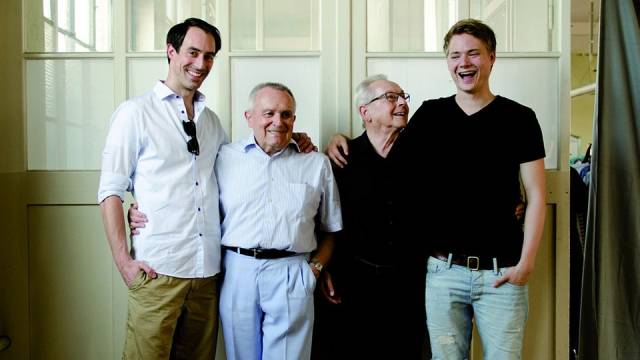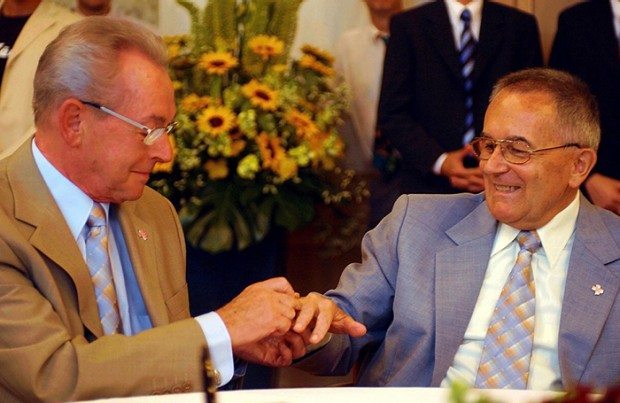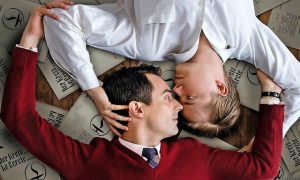

In The Circle, director Stefan Haupt tells the story of the title magazine: a gay publication created after WWII, which also became a social club for its subscribers. Two of them being schoolteacher Ernst Ostertag and drag performer Röbi Rapp, who fell in love and survived the turmoil of the era eventually becoming the first gay couple to get married in Switzerland. Part fiction (where Röbi and Ernst are played by Sven Schelker and Matthias Hungerbühler respectively), part documentary featuring interviews with Röbi and Ernst, The Circle is a moving essay about the power of love and the long way we still have to go when it comes to securing equal rights for people of all sexual orientations.
It is also the official Swiss submission at this year's Academy Awards, it will compete for a nomination with 82 other films from around the world. We had the opportunity to sit down with Röbi and Ernst to talk about their lifelong work, seeing actors play them onscreen and what getting that Oscar nomination would mean for them.
The Circle was founded by an actor, and I know that Röbi always had dreams of being onstage, but back then, why did you think art was important to help address these subjects society was ignoring?
Ernst: The magazine was mainly a literature magazine. What Rolf (Karl Meir) the founder wanted was to show the minority of homosexuals in Switzerland, that there was a homosexual culture, and that there were homosexuals who wrote great poetry and plays, and to bring them out of the minority complex they all had by thinking that being homosexual was a sin or an illness.
I found it very ironic that Swiss censors prohibited full frontal nudity in photographs, but they allowed drawings and paintings in the magazine, which could be much more subversive than any photograph.
(They both laugh)
Did you use these illustrations to point out how ridiculous this was?
Ernst: We were only allowed to show art, pornography wasn’t allowed, so to have a collection of erect penises was out of the question. But there was a also a secret edition of the magazine that we could buy which had drawings by Cocteau, drawings of Querelle de Brest by Jean Genet, which was the story of this mad love of a sailor, with some heavy pornographic scenes in it. To buy this magazine you had to sign a form that said you were over age 20. But this was never in the main magazine, in the French section of the magazine there were some poems by Genet and a summary of a short film he made.
Röbi: Censorship is always crazy.
Röbi, can you tell me more about the film you made when you were a child? I found it lovely that you say you always wanted to act, so can you elaborate on this?
Röbi: Of course it was a little bit difficult, at the end of WWII, when I was finished with school, my mother suggested I learned a profession to bring some money home. All the big schools for actors in Germany had been destroyed, so there were many actors who came to Switzerland from other countries to go to school, so I never stood a chance to get into these schools. I also looked quite young and very androgynous, so everyone said I couldn’t be an actor. When I was 18, Rolf said he needed an actress to play parts in serious theater, so I knew that was the chance for me. I loved doing cabaret, and onstage I’m much better as a woman than as a man.
What actresses did you draw inspiration from to perform?
Röbi: I had several! One of the most important was Marlene Dietrich, but also Maria Becker, Therese Giehse and Käthe Gold and I could play all of them onstage. As a boy I also learned how to sing and my voice as a woman was very good. At that time it wasn’t possible to perform on a traditional stage though.
Which is crazy because in Shakespearean times, men would play the female roles!
Röbi: Exactly!
Ernst: It was another century (laughs).
 Back then were you aware on any level of how important your work would be?
Back then were you aware on any level of how important your work would be?
Ernst: We could not imagine. The times were so difficult, everything was clandestine, at that time we would never even think the time would come when we would be able to live openly. I’m happy that we are still alive to see this. You also asked about the movie Röbi was in, so let me tell you about it. It was called Das Menschlein Matthias and it was about a ten year old boy whose mother wasn’t married and worked at a place…
Röbi: ...where the father was her boss!
Ernst: ...but he didn’t want to marry her, so she had to give away the boy to her sister, who lived on a farm up in the mountains. She didn’t treat him well, so he leaves because he couldn’t stand that anymore.
Röbi: So he escapes and goes back to his mother.
Ernst: Who then takes him to meet his father, so the father becomes interested in taking care of the boy. So finally the film has a happy ending.
Is that film available in Switzerland?
Ernst: Yes on DVD. It has been restored. You might be able to find a French copy too.
 How was it to see the actors in The Circle play you?
How was it to see the actors in The Circle play you?
Ernst: The two actors came to see us before and wanted to get to know us. The man who played Robbi didn’t speak our language.
Röbi: Sven came to us and we trained him in our Zurich dialect, so we became friends. He’s very good in the film, but he said it was difficult to play someone who was alive.
What do you think would be the importance of the film being nominated for an Oscar?
Ernst: The film reminds people that it’s good to open our minds, so it helps everyone, not just us. It’s an international message for men, women and children.
Röbi: It also should remind people that our lives were natural, not something special or different, and that’s what’s good about the film.
Ernst: Your neighbor might be homosexual, you don’t know and he’s a neighbor like anyone!
Röbi: It’s not even about sexuality, it’s about love.
It also should remind younger gay people about how hard people fought before us to get us to where we are.
Ernst: It’s also a great message for America, now that they are discussing gay marriage, to ask them how dare you judge the love between two human beings? Why is one love accepted and the other one isn’t? This is against nature!
The Circle opens in New York theaters on 11/21.
To learn more about Röbi and Ernst's work please visit https://schwulengeschichte.ch/